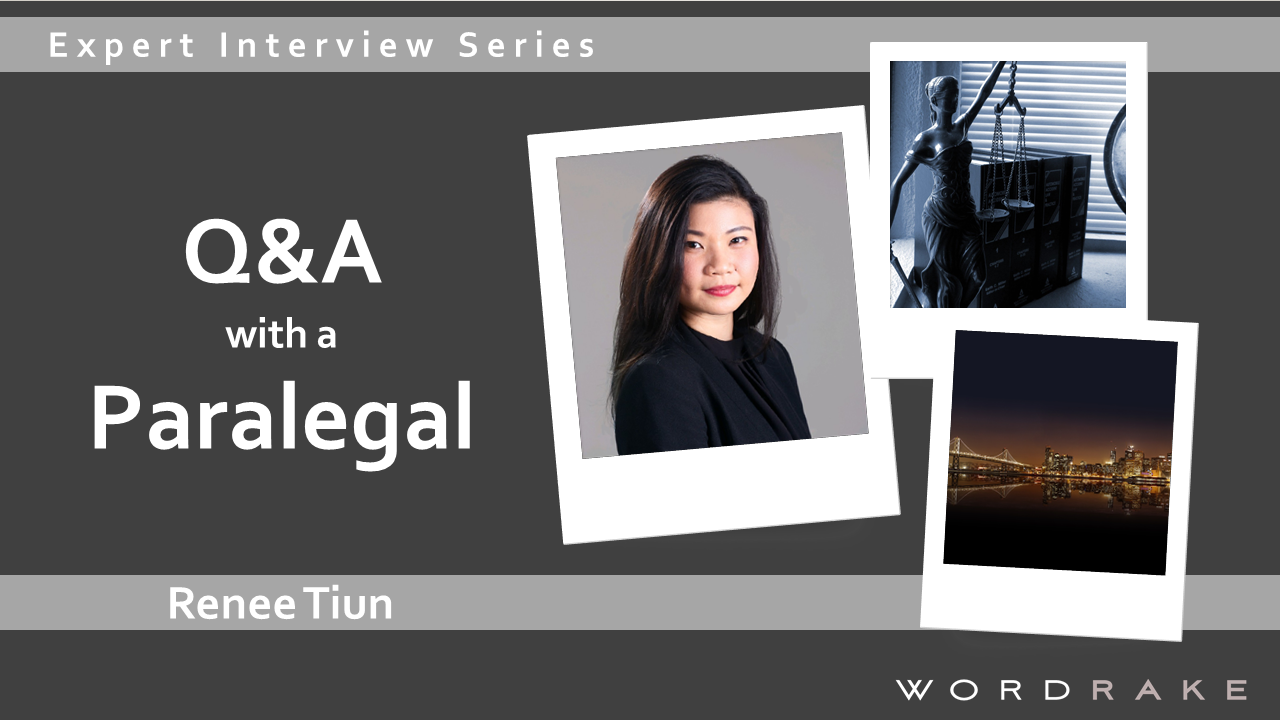Paralegals bring with them diverse skillsets, perspectives, and experiences that can elevate a law practice. One often-overlooked path is that of a lawyer educated outside of the United States who chooses to use their skills in a paralegal role. In this moving interview with lawyer-turned-paralegal Renee Tiun, she discusses her path to becoming a paralegal and how her unique experience gives her an advantage when serving international tax clients.
What is your role and how did you get to where you are today?
I am a paralegal with the tax team of BurgherGray, LLP. Our team focuses on international and domestic tax advisory and compliance, and estate and trusts planning. I received my authorization to work in the U.S. in late 2017, and, after searching for a job for seven months, I joined Klug Law Office in 2018 (Klug Law Office joined BurgherGray in September 2020). I started out with administration tasks and quickly learned U.S. tax laws and tax preparation. Within a year, my role evolved to include assisting the team with tax advisory and preparation work. I mostly work with U.S. citizens living abroad.
I was called to the bar in Malaysia in 2010 and practiced as a litigation lawyer before moving to the finance industry as a legal counsel in 2015. I moved to the U.S. in mid-2017. I knew I still wanted to work in the legal industry in the U.S., but I was not confident in my marketability, as I have no formal training or experience regarding U.S. laws nor the U.S. legal system. I am grateful that my boss took a chance and hired me, giving me the opportunity to have hands-on experience in the U.S. legal industry. It has been rewarding to work with my team. I plan to earn a Master of Laws and be called to the bar once the pandemic is under control and in-person lectures are safe again.
What are the biggest differences you’ve experienced in shifting from lawyer work to paralegal work?
I often felt I needed to prove myself. After a decade of practicing as a lawyer with the proper papers, coming to a new place where my credentials were not recognized devalued my experience as a lawyer. I do sometimes sense pushback from others, though I do not experience this with my team; my team knows my skills and capabilities, especially after working with me for three years.
Having worked as a lawyer and then as a paralegal, what is some high-value paralegal work you didn’t realize was happening while you were a lawyer?
When I was practicing as a lawyer, I did not realize how many administrative tasks paralegals are expected to do; these tasks may seem menial, but they are necessary to the practice. The small things add up. Having to juggle both billable work and administrative work can be a challenge.
What are the top 3 skills a paralegal must have for success?
Have a thick skin: Realize and assert your worth as someone with experience in the legal industry—it takes practice to hone assertiveness. Time management: It’s tough to juggle the different kinds of work we are expected to complete. Sound analytical skills are also necessary to success as a paralegal.
What skills do you use now in your role as a paralegal that you didn’t use in your work as a lawyer?
As a paralegal, I manage an office (I am tasked with some management duties at our office in D.C.) and juggle time between billable and administrative work. As an associate back in Malaysia, I did not have to worry about the daily administrative side of things and could just focus on my cases.
What’s the most effective way for a lawyer to involve a paralegal in a project? What’s the best way for a lawyer to ask for paralegal help?
Lose the sense of hierarchy. Respect everyone and treat everyone as equals. People, paralegals included, bloom where they are encouraged and not looked down upon. Had my current team not encouraged me and given me opportunities, I would not be where I am today.
What should a new lawyer know about working with paralegals?
Paralegals may not have the official papers to be called a lawyer, but we may have a wealth of knowledge or skills because of our years of experience. A lawyer can learn as much from a paralegal as any paralegal can learn from a lawyer.
What do you wish senior lawyers understood about working with paralegals?
I have been treated well by my team, because I was treated as an equal who can add value to the firm. When I asked questions, regardless of how superfluous I had thought they might be, my team responded with respect and gave me guidance; this encouraged me to keep learning.
Are there any surprising tasks that most people don’t realize paralegals can handle? If yes, what are they?
I may be biased because of my background, but I think paralegals can do most of what a lawyer can do, save for court appearances and anything related to that. It may take a longer time for us to do it as we lack the formal training, but a day’s worth of experience can carry us far.
What advice do you have for lawyers and paralegals working together?
Treat everyone as equals. Everyone has their own skills and knowledge to bring to the table; everyone is of value to the team.
What accomplishment are you most proud of in your current role?
I am proud that I have my own portfolio, which indicates the trust that my team has in me. Three years ago I knew almost nothing about the U.S. taxation system and laws, and now I have my own portfolio of mostly international clients.
About Renee Tiun
Renee Tiun hails from Malaysia and is now based in the Washington, D.C. office of BurgherGray, LLC. She completed her Bachelor of Laws in 2009 and was admitted to the Malaysian Bar in 2010. She has 5 years of experience as a private practitioner, largely focusing on civil litigation. In 2015, Renee joined the financial services sector in Kuala Lumpur as a legal counsel, until life brought her to the United States in 2017. She believes her experience as a young professional in Malaysia’s growing economy has equipped her with the skills to integrate and succeed in the competitive legal workforce in the U.S. Since July 2018, Renee has worked as a paralegal in Washington, D.C., focusing on international and domestic taxation, business, and estate planning.
About the Paralegal Interview Series
This interview is part of a collection of interviews about paralegal work. By producing this series, we hope to shine a light on some of the most important but often undervalued people in law: paralegals. Paralegals are key contributors to a high-value legal practice and are more effective when they’re empowered. Let’s start working better together.
Nearly everyone working in a law firm writes, and that writing must be done well. WordRake can help produce better, clearer documents in less time. WordRake is clear and concise editing software designed for people who work with confidential information. The software improves writing by simplifying and clarifying text, cutting legalese, and recommending plain English replacements. WordRake runs in Microsoft Word and Outlook, and its suggestions appear in the familiar track-changes style. Learn more about our paralegal program and our 2-week enterprise pilot. Or try an individual license of WordRake for free for 7 days.






